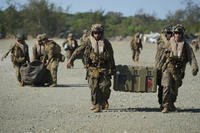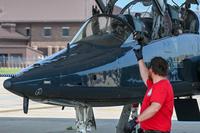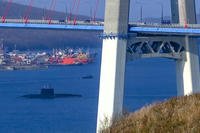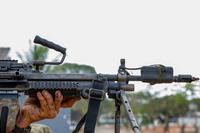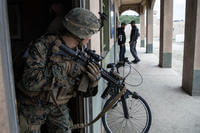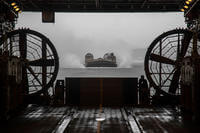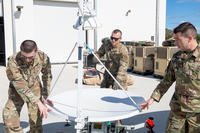Like a lot of other sage observers, Naval Postgraduate School professor John Arquilla isn't nuts about the idea of spending a ton on Cold War-style weapons systems when we're supposed to be fighting terrorists and insurgents. But Arquilla is one of the first military analysts I've heard say that "the Pentagon's big platforms [aren't] merely the wrong weapon systems to fight present and future wars, but [are] actually likely to bring defeat." In an interview with Technology Review, the author of Networks and Netwars: The Future of Terror, Crime, and Militancy explains:
In an interview with Technology Review, the author of Networks and Netwars: The Future of Terror, Crime, and Militancy explains:
[O]ur military today oversees spending of about a billion and a quarter dollars every day. Most of that is misspent... The principal argument for that is: "We have to keep the big, old-style military because we might fight a big, old-style war one day." But in the future the bigger you are, the harder you're going to fall to ever-more accurate weapons. Creating a mass army to deal with an old-style mass army is simply to put hundreds of thousands of our troops in harm's way needlessly.
TR: In short, smart, precision-targeted weapons like cruise missiles are going to become increasingly cheap and available to any government or group that can afford them. The Falklands War between Britain and Argentina gave early indications of the vulnerability of big platforms, didn't it?
JA I think so. The lessons there include: how many British submarines did it take to pen up the entire Argentine navy? Two. Simultaneously, the Exocet missile proved the slow-moving capital ship's vulnerability. Today, the Chinese aren't developing aircraft carrier battle groups, but brilliant sea-going mines that know how to maneuver, supersonic anti-ship missiles -- which means the Falklands War on steroids -- and super-cavitation torpedoes, which create a bubble of air in front of the torpedo, letting them move at hundreds of knots per hour. The Chinese have an explicit "swarming" doctrine that can best be characterized as sea power without a navy. In this new naval antagonism that's emerging, our potential enemies are not trying to emulate what we're doing. Instead, they're innovating in very thoughtful, effective ways
Since we're spending so much on military affairs, maybe some of that should be directed towards technologies that will break our opponents' communications. In World War II, there was an investment in creating the first high-performance computers, for that very purpose. Today, it may be an investment in creating the most effective quantum computing or figuring out how to structure the vast ocean of data that masks the movements of al-Qaeda on the Net and the Web. We need a new Bletchley Park [the country house where the German WWII codes were broken], if we're going to win this war.
TR: Aren't our enemies in Iraq an entirely human network? It's not clear that breaking into their Internet communications...
JA: Oh, but they don't exist without the Web and the Net. You don't move around that country easily and even the old-school Baathist insurgent elements rely on the Web. A networked insurgency doesn't have anything like a traditional leadership. Most of the leadership they get is by going on websites, where they share information very quickly.
TR: Could we take down the Net in Iraq and would it have the effect of downing the insurgency to a significant degree?
JA: You could end all Internet access in Iraq and it would in many ways cripple the insurgents, in terms of slowing them down tremendously. But you'd also cripple reconstruction.
TR: So, in other words, we should data-mine Net exchanges within Iraq?
JA: There you go.
